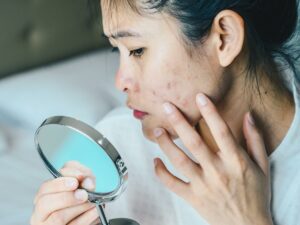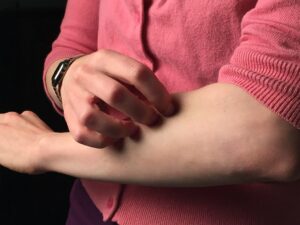Dermatillomania is when people pick at their skin. It is a mental health condition that can be bad if it takes over your life. You should try to stay away from the urge to do this. OCD and anxiety are common triggers for this disorder. Dermatillomania can cause sores on the body or even scars if left untreated. It can also lead to social isolation or embarrassment over one’s appearance. The good news is that dermatillomania is treatable with therapy and medication!
Contents
Understanding Dermatillomania

Dermatillomania is an impulse control disorder. People that have this condition are not in control of their actions. There are often triggers for these behaviors including OCD and anxiety disorders, depression, or other mental health conditions.
Excoriation disorder is a type of obsessive-compulsive disorder. It can be psychological. It’s caused by picking at your skin. It causes damage and it affects your life.
Individuals may pick at healthy skin, minor skin irregularities (e.g., pimples or calluses), lesions, or scabs. This disorder is usually chronic, with periods of remission alternating with periods of greater symptom intensity. If untreated, skin-picking behaviors may come and go for weeks, months, or years at a time. Some people who have this disorder spend a lot of their time picking at themselves. Sometimes they do it for a long time.
Skin picking is a behavior that people do. They do it because they are not happy with themselves. Skin picking often starts when someone is 13 or 15 years old, but it can happen to children who are younger than 10, or adults who are 30-45 years old. Excoriation disorder is when people pull off their own skin. It happens more often in women than men.
Symptoms of Dermatillomania

People that have Dermatillomania will often pick at their skin. Sometimes it is just a little here and there, while other times they can get completely obsessed with picking. This behavior usually means something to the person who has this disorder—it may be an attempt to relieve anxiety or boredom for example.
To be diagnosed with excoriation disorder, a person must show the following signs and symptoms:
- Excess skin tearing is another major problem when people use a home depilatory device. Bacteria create an infection and the wounded skin becomes raw and inflamed, resulting in pimples or worse yet – bleeding.
- Picking at the face or body, despite any discomfort.
- If you don’t want to go to social situations because you are embarrassed about your appearance, then that is a sign of body dysmorphic disorder.
- Recurrent picking on your skin can cause it to get worse. This is called “recurrent skin picking”.
- A person is trying to stop the behavior. They are doing it many times, but they cannot do it.
The symptoms of a mental illness cause people to be very sad and have trouble doing their work. They are not caused by any other thing, like drugs or a medical condition.
Causes
Dermatillomania happens because of a mental health disorder. It can happen to people who have OCD, anxiety disorders or depression. This causes them to pick at their skin. There are also some other reasons that this might be happening:
- Something happened in the past that makes someone want to pick at their skin more than usual.
- The person is trying to relieve boredom or stress.
- They are not happy with how they look and skin picking makes them feel better.
Co-occurring Disorders

People can have more than one disorder. These is called “co-occurring disorders”. When it comes to Dermatillomania, there are two things that this might be:
- Another mental health condition like OCD or depression
- A medical condition like tic disorder, autism spectrum disorders (ASD), or trichotillomania.
- Doctors think that this disorder is caused by the same thing as OCD. When people with OCD feel like their behaviors are not normal, it can make them want to do things more than usual or differently than they usually would (for example: wanting to wash your hands over and over again until they bleed).
- People who have OCD sometimes pick at their skin to try and feel good about themselves. They might think that they look better after picking, which is not true.
Treatment of Dermatillomania
There are different types of treatment that people can do to help themselves. For this disorder to go away, a person needs to figure out what is causing them stress and/or anxiety. They also need to learn how to better deal with their thoughts and feelings.
There are different types of treatment that people can do to help themselves. Some people might try counseling or therapy, which is a type of talking to a mental health professional about your problems. Other people might take medications for their anxiety or depression. There are also treatments like cognitive-behavioral therapy and habit reversal training.
Medication
There are several different types of medications that doctors use to treat people with depression and anxiety. Some antidepressants help people who have OCD too. These medications usually work by changing the levels of serotonin in the brain.
Therapy
There are different types of therapy that people can try to help themselves with Dermatillomania. One type is cognitive-behavioral therapy (CBT). This therapy helps people change their thoughts and behavior so they pick less. Another type of therapy is habit reversal training. This helps people learn how to do something else when they feel the urge to pick their skin.
Cognitive-behavioral Therapy (CBT) is a type of talk therapy, but instead of talking about the past or other things like many kinds of therapy, CBT helps you learn new ways to think about your problems and deal with them.
Counseling
When a person has Dermatillomania, it is often because they are dealing with other mental health problems like OCD or depression. Counseling can help people deal with these problems and might make it easier for them to stop picking their skin.
Self-care
People with mental health problems need to take care of themselves too! This means eating healthy and getting enough sleep. It also means taking time for yourself to do things that make you happy. Taking a break from work or school can help, as well as spending time with friends and family.
Risk Factors Of Dermatillomania

Some things can make a person more likely to have Dermatillomania. These include:
- Having another mental health problem like OCD or depression
- Having parents with skin picking problems
- Stressful events in your life, such as moving or going away to college for the first time
- Being a perfectionist
- Trying to hide your skin picking from others
There is no one cause of Dermatillomania. It can be caused by different things for different people. This is why people with this disorder need to find out what is causing them stress and/or anxiety. If they can figure this out, they can learn to better deal with their thoughts and feelings.
People who have Dermatillomania might benefit from different types of treatment, like counseling or therapy. They also need to take care of themselves by eating healthy and getting enough sleep. There are some things that people can do on their own too, like practicing relaxation techniques (like yoga or meditation) or taking time for themselves (like spending some time alone). Sometimes family members and friends can help too, like by encouraging the person to go see a mental health professional.
Preventive Measures Of Dermatillomania
There are some things that people can do to try and prevent themselves from picking their skin. Most of these things have to do with managing stress and anxiety. Some examples are:
- Exercising regularly
- Eating a healthy diet
- Getting enough sleep
- Practicing relaxation techniques like yoga or meditation
- Talking to a counselor or therapist about your problems
- Joining a support group for people with Dermatillomania
Dermatillomania can be a very difficult disorder to deal with. It is important to remember that you are not alone and some people can help you. If you think you might have Dermatillomania, please see a doctor or mental health professional.
Conclusion
If you suffer from this disorder, it is important to keep in mind that there are resources out there for you. The more we learn about dermatillomania and the treatments available, the better equipped we will be to help those who need our support. We hope that by reading through these blog posts on dermatillomania, you have learned a little bit more about what your options may be if you or someone close to you suffers from this condition. Let us know how we can assist with educating others on mental health topics like dermatillomania so they too can get the help they deserve!
If you are looking for affordable Online Counseling MantraCare can help: Book a trial therapy session


